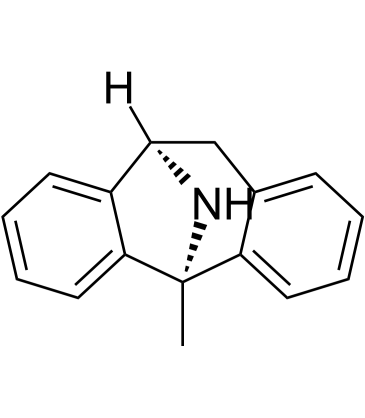| Description |
Dizocilpine, a potent anticonvulsant, is a selective and non-competitive NMDA receptor antagonist, with a Kd of 37.2 nM in rat brain membranes. Dizocilpine acts by binding to a site located within the NMDA associated ion channel and thus prevents Ca2+ flux[1][2].
|
| Related Catalog |
|
| Target |
Ki: 37.2 nM (NMDA receptor, in rat brain membrane)[1]
|
| In Vitro |
Dizocilpine progressively suppresses of current induced by NMDA. Mg2+ (10 mM) prevents Dizocilpine from blocking the N-Me-D-Asp-induced current, even when MK-801 is applied for a long time in the presence of NMDA. MK-801 blocks NMDA-activated single-channel activity in outside-out patches[3]. Dizocilpine (< 500 μM) inhibits activation of microglia induced by LPS with increased Cox-2 protein expression in BV-2 cells. MK-801 (< 500 μM) reduces microglial TNF-α output with an EC50 of 400 μM in BV-2 cells[4].
|
| In Vivo |
Dizocilpine (MK 801) (1 mg/kg) treatment before each METH injection reduces the extent of DA depletion by 55% in striatal of mice. Dizocilpine (MK 801) (1 mg/kg) also attenuates the effects of METH on microglial activation in striatal of mice[4]. Dizocilpine ((+)-MK 801) (0.05, 0.2 mg/kg, i.p.) attenuates subsequent cocaine-primed reinstatement without disruption in rats. Dizocilpine (MK 801) (0.2 mg/kg, i.p.) prior to two reactivation sessions in the home cage shows no suppression on subsequent cocaine-primed reinstatement[5]. Dizocilpine (0.03, 0.1, 0.3 and 1 mg/kg, i.p.) significantly increases the ambulation of mice at 0.3 and 1 mg/kg, but not at 0.03 and 0.1 mg/kg[6].
|
| References |
[1]. Wong EH, et al. The anticonvulsant MK-801 is a potent N-methyl-D-aspartate antagonist. Proc Natl Acad Sci U S A. 1986 Sep;83(18):7104-8. [2]. Vardhan Reddy KH, et al. Convergent Strategy to Dizocilpine MK-801 and Derivatives. J Org Chem. 2018 Apr 6;83(7):4264-4269. [3]. Huettner JE, et al. Block of N-methyl-D-aspartate-activated current by the anticonvulsant MK-801: selective binding to open channels. Proc Natl Acad Sci U S A. 1988 Feb;85(4):1307-11. [4]. Thomas DM, et al. MK-801 and dextromethorphan block microglial activation and protect against methamphetamine-induced neurotoxicity. Brain Res. 2005 Jul 19;1050(1-2):190-8. [5]. Brown TE, et al. The NMDA antagonist MK-801 disrupts reconsolidation of a cocaine-associated memory for conditioned place preference but not for self-administration in rats. Learn Mem. 2008 Dec 2;15(12):857-65. [6]. Iijima Y, et al. Modification by MK-801 (dizocilpine), a noncompetitive NMDA receptor antagonist, of morphine sensitization: evaluation by ambulation in mice. Nihon Shinkei Seishin Yakurigaku Zasshi. 1996 Feb;16(1):11-8.
|
